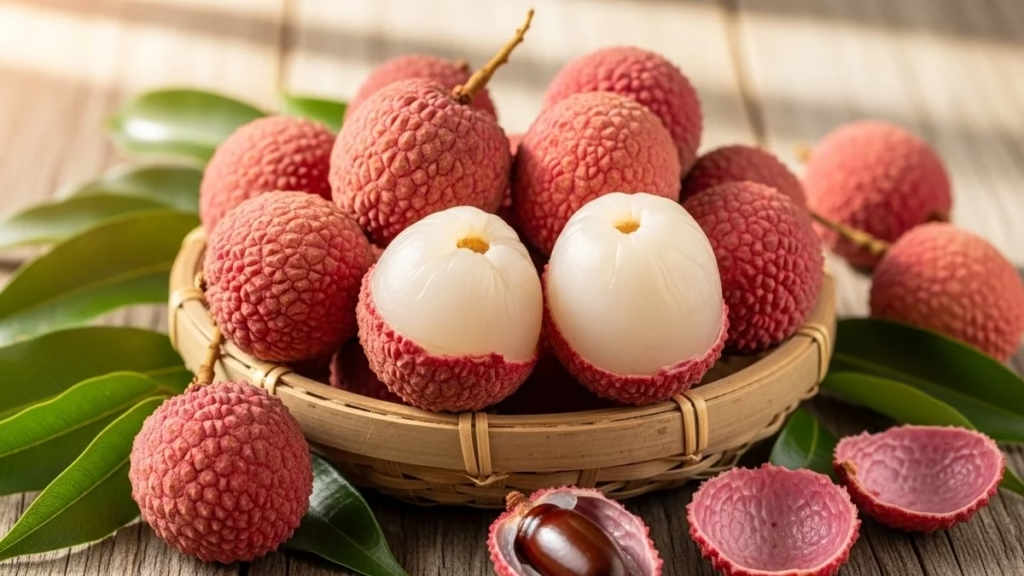Lychee fruit (Litchi chinensis) is a sweet, juicy tropical fruit often called the “queen of fruits” in Asia. Its pink-red bumpy skin hides a translucent, aromatic flesh that offers a refreshing taste similar to grapes and pears. Native to China, lychee has been cultivated for over 2,000 years and is now enjoyed across the globe in fresh, dried, and canned forms.
In this article, we’ll explore everything about lychee—including its nutritional profile, health benefits, possible risks, and easy ways to enjoy it—so you can decide if this fruit deserves a spot in your diet.
What Is Lychee?
Lychee is a subtropical fruit that grows in clusters on evergreen trees. The fruit is typically 1–1.5 inches in size with a rough, leathery skin that peels away easily. Inside, you’ll find:
- Flesh: Juicy, white, jelly-like texture with a floral-sweet taste.
- Seed: A large, brown, inedible seed at the center.
Lychee is widely available in fresh markets during summer months, and you can also find it canned in syrup or dried, where it is sometimes called “lychee nuts.”
Lychee Nutrition Facts
Like many tropical fruits, lychee is low in calories but rich in vitamins, minerals, and antioxidants.
Here’s the nutritional breakdown of 100 grams (about 9 lychee fruits):
| Nutrient | Amount | % Daily Value (DV) |
|---|---|---|
| Calories | 66 kcal | – |
| Carbohydrates | 16.5 g | – |
| Sugars | 15 g | – |
| Fiber | 1.3 g | 5% |
| Protein | 0.8 g | 1% |
| Fat | 0.4 g | 0% |
| Vitamin C | 71.5 mg | 119% DV |
| Vitamin B6 | 0.1 mg | 5% DV |
| Copper | 0.1 mg | 9% DV |
| Potassium | 171 mg | 5% DV |
| Magnesium | 10 mg | 3% DV |
Key Takeaway: Lychee is an excellent source of vitamin C and provides beneficial minerals like copper and potassium, supporting immunity and heart health.
Health Benefits of Lychee
1. Rich in Vitamin C for Immunity
Lychee provides more than 100% of your daily vitamin C needs in just one cup. Vitamin C plays a vital role in boosting the immune system, wound healing, and collagen production.
2. Powerful Antioxidants
Lychee contains polyphenols, flavonoids, and vitamin C, which help fight oxidative stress and protect against chronic diseases. The compound oligonol, found in lychee, may improve blood circulation and reduce fatigue.
3. Supports Heart Health
With its potassium and antioxidants, lychee may help regulate blood pressure and reduce the risk of heart disease by lowering cholesterol and improving blood vessel function.
4. Promotes Skin Health
Vitamin C and antioxidants in lychee support collagen synthesis, which keeps skin firm and youthful. Some studies suggest lychee extract may help reduce UV-induced skin damage.
5. Aids Digestion
The fiber in lychee helps support healthy digestion and may prevent constipation. Its natural sugars also provide a quick source of energy.
6. Hydration and Cooling Effect
Because lychee is 82% water, it’s a refreshing fruit to eat in hot weather, helping prevent dehydration.
Potential Risks and Side Effects
While lychee offers many health benefits, there are some considerations to keep in mind:
- Natural Sugars: Lychee is high in sugar (about 15g per 100g), so people with diabetes should eat it in moderation.
- Unripe Lychee Warning: Eating unripe lychee on an empty stomach has been linked to low blood sugar and acute illness in children, particularly in rural India. Always eat ripe lychee.
- Allergic Reactions: Rarely, some individuals may experience allergic reactions such as itching, swelling, or breathing difficulty.
- Canned Lychee: Often packed in heavy syrup, which adds extra sugar. Choose fresh or dried lychee when possible.
How to Eat Lychee
Lychee is versatile and can be enjoyed in multiple ways:
- Fresh: Peel the outer skin, remove the seed, and eat the juicy flesh.
- Juices & Smoothies: Blend lychee with other tropical fruits for a refreshing drink.
- Desserts: Add to fruit salads, ice creams, puddings, and jellies.
- Dried Lychee (Lychee Nuts): Sweet, chewy, and often used in Asian snacks.
- Culinary Uses: In Asian cuisine, lychee pairs well with seafood, chicken, and spicy dishes.
Lychee vs. Other Tropical Fruits
| Fruit | Calories (100g) | Vitamin C | Fiber | Unique Benefit |
|---|---|---|---|---|
| Lychee | 66 kcal | 71 mg | 1.3 g | Rich in oligonol antioxidants |
| Mango | 60 kcal | 36 mg | 1.6 g | High in vitamin A |
| Pineapple | 50 kcal | 48 mg | 1.4 g | Contains bromelain (anti-inflammatory) |
| Longan | 60 kcal | 84 mg | 1.1 g | Similar to lychee, sweeter flavor |
Who Should Eat Lychee?
Lychee is a great choice for:
- People wanting to boost immunity naturally.
- Those looking for a hydrating summer fruit.
- Individuals who enjoy tropical flavors in desserts and smoothies.
- Anyone seeking an antioxidant-rich food for skin and heart health.
Tips for Buying and Storing Lychee
- Buying: Choose bright red lychee with firm skin. Avoid fruits with cracks or browning.
- Storage: Fresh lychee can be refrigerated for up to 1 week. Peel just before eating to preserve freshness.
- Freezing: Lychee can be frozen whole (with skin) for longer storage—simply thaw and peel when ready to eat.
Conclusion
Lychee is more than just a delicious tropical fruit—it’s a nutrient-dense powerhouse that supports immunity, skin health, digestion, and hydration. While moderation is important due to its natural sugar content, enjoying ripe lychee as part of a balanced diet can bring both taste and health benefits.
So, the next time you see this pink-red gem at your local market, don’t hesitate to pick some up—you’ll be adding both flavor and nutrition to your day.
- For more nutrition blogs, check out BlogAdviser365.
- Learn more about lychee’s cultivation and research from National Library of Medicine.







